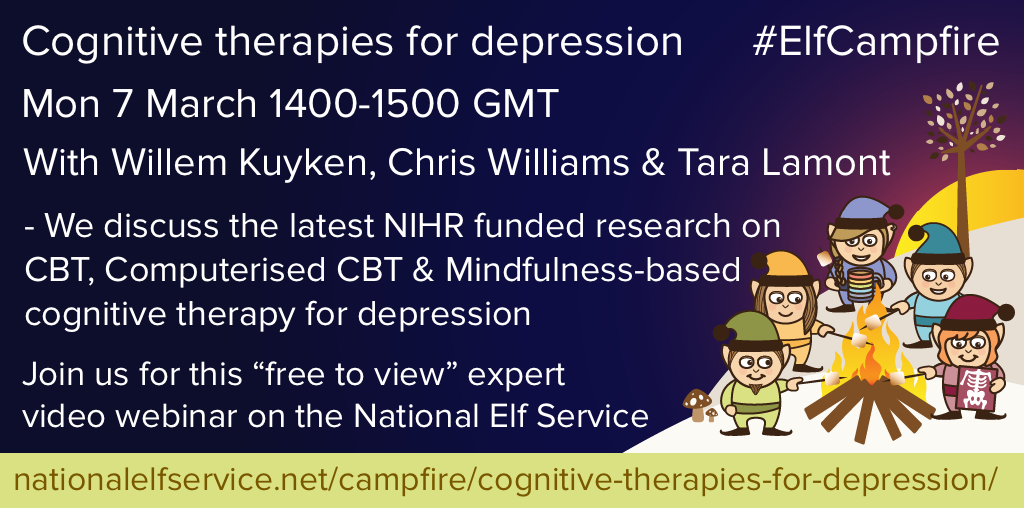
The new NIHR-DC (National Institute for Health Research Dissemination Centre) Highlight on Cognitive Therapies for Depression is fresh out today and I am pleased to have been given the opportunity to analyse it for readers of the Mental Elf.
This document provides an update of recent NIHR-funded research regarding cognitive therapies for depression. It’s based on three large randomised controlled trials (RCTs), which are all listed with full-text links at the end of this blog. At the Mental Elf, we have blogged about each of these trials when they came out, and sometimes dedicated more than one blog.
In what follows, I will attempt to balance the portrayal of these trials, as done by my fellow elves, with their presentation in the NIHR Highlight and emphasise some critical aspects. In the interest of succinctness, each trial will be considered separately and identified by its acronym:
- REEACT (Littlewood et al, 2015)
- CoBalT (Wiles et al, 2014 and 2016)
- PREVENT (Kuyken et al, 2015)

The NIHR-DC Highlight shines a light on three recently published RCTs about cognitive therapies for depression in adults.
REEACT
A Mental Elf blog on the REEACT trial offered a critical assessment of what its results spell out for computerised CBT (cCBT) in primary care. This large trial involved 691 depressed participants (defined as scoring over a threshold of a self-report scale: the PHQ-9) from 83 GP practices. They were randomised to either a freely available or a commercial cCBT program, or to usual care.
Results showed no significant differences in depression among the three groups, neither post-intervention, nor at a longer follow-up of 24 months. Results also revealed high drop-out rates and small adherence to cCBT (roughly 1 in 5 patients completed the intervention). Given that this was a pragmatic trial designed to closely mimic what happens in primary care, our blog questioned whether cCBT might indeed be useful in these settings, despite its routine promotion and wide distribution.
The NIHR Highlight, while accurately reflecting the results of this trial, tends to focus on potential reasons for why they were less encouraging than expected. This is effectively spin. For instance, the Highlight seems to discount the fact that the lack of adherence to the cCBT is also an outcome that reflects on the utility of this program, particularly in view of wide dissemination. The document also states that “it is not possible to tell whether people might have benefited from the CBT, had they completed the course”. While this is certainly an evident statement, it also doesn’t give much additional information beyond “we don’t know”. The inference that the reason participants had difficulties with cCBT was that it was provided with minimal support is a plausible conjecture, but a conjecture nonetheless. Pending that, the concrete result that does remain is that in the largest study of cCBT in a primary care setting, participants for the most did not engage with and did not benefit from cCBT over what they would have obtained from regular GP care.
A follow-up trial (REEACT 2) will be published soon, so perhaps the findings of that study will help shed more light on the value of cCBT for depression in adults.

In November 2015 we blogged the REEACT trial and concluded that computerised CBT for depression is no better than usual GP care.
CoBalT
As blogged on the Mental Elf (here, here and here), this large randomised trial with 469 participants from 73 general practices showed that adding CBT on top of antidepressant medication was an effective and cost-effective alternative compared to usual care (which almost invariably involved antidepressants alone) for patients with treatment resistant depression. Treatment resistant depression was defined in this study as having adhered for at least 6 weeks to an adequate dose of antidepressants and still having a score on the self-report questionnaire BDI-II (The Beck Depression Inventory-II) of over 14. Results were maintained at long-term follow-up (3-5 years).
The Highlight accurately reflects these findings and their implications, though maybe it would have been useful to acknowledge some of the challenges and controversies around defining treatment resistant depression (see for instance Malhi and Byrow, 2016).

In February 2016 we blogged CoBalT and concluded that CBT plus usual care (including antidepressants) is clinically and cost effective in the long-term for people whose depression has not responded to medication.
PREVENT
This large trial involved 424 participants from 95 GP practices, who had had three or more previous major depressive episodes and were currently on a therapeutic maintenance dose of antidepressants. Participants were randomised to either mindfulness-based cognitive therapy including support to taper or discontinue antidepressants (MBCT-TS) or to maintenance antidepressants. Results showed no differences between the two arms for time to relapse or recurrence of depression over 24 months.
In our Mental Elf blog, while we commended the PREVENT trial for being well-conducted and transparently reported, we also exposed a crucial caveat: this trial was not conducted with the purpose, the design and particularly the data analysis plan required for establishing equivalence or even non-inferiority. So the fact that it finds no statistically significant differences when comparing the two treatments is not the same as demonstrating the two treatments are equally effective. This is even more of a problem, given that there was no usual care or attention control group which could have been used to contrast each of the two interventions. Moreover, the lack of such group also carries the implication that the benefits of MBCT-TS might be non-specific.
While the NIHR Highlight accurately acknowledges that the lack of a control group hampers extracting firm conclusions about MBCT, it nonetheless paints an overly optimistic picture of the implications of this trial. Though it casts the results correctly in terms of not finding differences between the two interventions, it also appears to inaccurately conflate the lack of significant differences with establishing equivalence or non-inferiority. It would serve the public better if this distinction was made transparent.
Further proof of the relevance of the distinction between what can be concluded from a superiority versus a non-inferiority or equivalence trial is ironically provided by a recently published RCT of a similar MBCT intervention for relapse prevention in depression (Huijbers et al., 2016). In this non-inferiority trial, the authors showed that MBCT with discontinuation of antidepressant medication was inferior to the combination of both interventions for depressive relapse and recurrence over 15 months.

In April 2015 we blogged PREVENT and concluded that mindfulness based cognitive therapy is a promising intervention for preventing depression.
Conclusions
While the latest large trials of cognitive therapies are undoubtedly exciting and worthy of public attention, I am concerned that this new NIHR Highlight presents a somewhat edulcorated representation of computerised CBT as an effective low-intensity intervention and overplays the evidence for mindfulness based cognitive therapy as an alternative to antidepressants for relapse prevention.
Want to know more?
Note from the Editor: We will be getting together around the campfire next week (Monday 7th March at 2pm GMT) to discuss the papers covered by this blog. Our expert panel will include Willem Kuyken (PREVENT), Chris Williams (CoBalT), Tara Lamont (NIHR-DC) and Ioana Cristea.
You can watch the live broadcast or join the discussion on Twitter at #ElfCampfire.
If you miss the broadcast, don’t fret, you can watch it in full and download all of the supporting presentations and background reading on the Cognitive therapies for depression campfire page.
Links
Primary paper
Cognitive therapies for depression highlight. National Institute for Health Research Dissemination Centre, 2 Mar 2016.
Other references
Littlewood E, Duarte A, Hewitt C, Knowles S, Palmer S, Walker S, et al., 2015 A randomised controlled trial of computerised cognitive behaviour therapy for the treatment of depression in primary care: the Randomised Evaluation of the Effectiveness and Acceptability of Computerised Therapy (REEACT) trial. Health Technol Assess , 19(101)
Wiles N, Thomas L, Abel A, Barnes M, Carroll F, Ridgway N, et al., 2014 Clinical effectiveness and cost-effectiveness of cognitive behavioural therapy as an adjunct to pharmacotherapy for treatment-resistant depression in primary care: the CoBalT randomised controlled trial. Health Technol Assess, 18(31).
Wiles, Nicola J et al., 2016 Long-term effectiveness and cost-effectiveness of cognitive behavioural therapy as an adjunct to pharmacotherapy for treatment-resistant depression in primary care: follow-up of the CoBalT randomised controlled trial. The Lancet Psychiatry, 3(2).
Kuyken W, Hayes R, Barrett B, Byng R, Dalgleish T, Kessler D, et al., 2015 The effectiveness and cost-effectiveness of mindfulness-based cognitive therapy compared with maintenance antidepressant treatment in the prevention of depressive relapse/recurrence: results of a randomised controlled trial (the PREVENT study). Health Technol Assess, 19(73).
Huijbers, M J et al 2016. Discontinuation of antidepressant medication after mindfulness-based cognitive therapy for recurrent depression: randomised controlled non-inferiority trial. The British Journal of Psychiatry bjp.bp.115.168971.
Malhi, GS, Byrow, Y, 2016. Is treatment-resistant depression a useful concept? Evid Based Ment Health 19, 1–3.



Cognitive therapies for depression in adults: let’s just stick to the facts https://t.co/Wwnz49yL5B #MentalHealth https://t.co/czlSZh2qMp
Today @Zia_Julia summarises REEACT, CoBalT & PREVENT trials. Cognitive therapies for depression https://t.co/8ownFiwMAI #CBT #ElfCampfire
Morning @NIHR_DC @SimonGilbody @OMC_mindfulness Any thoughts on @Zia_Julia’s blog today? https://t.co/8ownFiwMAI #ElfCampfire
@Mental_Elf @NIHR_DC @SimonGilbody @OMC_mindfulness @Zia_Julia Well, I learned a new word! But seriously, this reflection is essential.
Cognitive therapies for depression
NIHR highlight https://t.co/aqIghF6m99
Blog https://t.co/dn67v7Guej
#ElfCampfire https://t.co/V6YDKyisF9
@Mental_Elf Thanks for the blog. And for introducing me to ‘edulcorated’ – you elves have a very rich vocabulary!
RT @Zia_Julia: My latest blog @Mental_Elf takes a critical look at the @NIHR_DC highlight on cognitive therapies for depression https://t.c…
#Cognitivetherapies for #depression in adults https://t.co/IF1dHddgjW @Mental_Elf reviews @NIHR_DC paper finds it edulcorated (a real word!)
New @NIHR_DC Highlight shines a light on 3 RCTs about cognitive therapies for depression in adults https://t.co/8ownFiwMAI #ElfCampfire
Great summary. I absolutely agree with you on the way that the uptake (or not) of cCBT has been more or less ignored. If there was a drug therapy that 4 in 5 people found unacceptable and ceased taking, we wouldn’t then ask, “oh, but if only people push through the side effects and weird times they have to take it, maybe they might get some benefits.” It really does seem at odds with the kind of scrutiny more invasive (and more expensive?) treatments receive. Or am I just being a little too cynical?
Looking forward to an interesting webinar on Monday!
[…] 1Cognitive therapies for depression in adults- Mental Elf Blog post. […]
RT @Mental_Elf: PREVENT trial shows that mindfulness based cognitive therapy is promising for preventing depression https://t.co/8ownFiwMAI…
Don’t miss – Cognitive therapies for depression in adults: let’s just stick to the facts https://t.co/8ownFiwMAI #EBP #ElfCampfire
Cognitive therapies for depression in adults: let’s just stick to the facts https://t.co/48l1UTUl2M via @sharethis
RT @Mental_Elf: REEACT trial shows that computerised CBT for depression is no better than usual GP care https://t.co/8ownFiwMAI #ElfCampfire
Cognitive therapies for depression in adults: let’s just stick to the facts https://t.co/UL9hXTdIf5
Read @Zia_Julia
Cognitive therapies for depression in adults: let’s just stick to the facts.
https://t.co/8ownFiwMAI #elfcampfire
Cognitive therapies for depression in adults: let’s just stick to the facts https://t.co/4UVqJIziO0 via @sharethis
I was sorry that technical difficulties meant I could not join this discussion as I very much wanted to contribute. Depression causes untold human suffering affecting 1 in 10 people in the UK each year, some six million people. It typically has an early age of onset and its recurrent course means it is a leading cause of disability. The last few years has seen a year on year increase in antidepressant prescribing. The recent MQ survey of research priorities pointed to preventing depression and its recurrence as the top priority, as was organising depression services to improve access, reduce wait times and improve outcomes. The call for parity of esteem for mental health alongside physical health is welcome, as is NIHR’s investment in research to find psychological treatments that work.
I very much appreciated the Chair asking the panel to consider the bigger picture at the end. To properly contextualise them, these studies need to be considered alongside the broader psychological treatments for depression literature. We desperately need to improve our understanding of depression and develop biological, social and psychological approaches that prevent depression recurrence, and if possible first onset of depression in late adolescence and early adulthood. Depending on your perspective, my view across the literature as a whole is that we have a set of approaches that are about as good as each other, or from a cup half empty perspective equally bad. Trials of course consider populations, and some of these treatments will be life changing, helpful, neutral or possibly even unhelpful to individuals within those populations. That is why treatment choice is so important and IAPT is moving towards providing greater choice and importantly monitoring the impact as choice is introduced. To my mind the most important question for those who do the research and critique the research is, “how can we move our understanding and treatments forwards?” We have a long way to go to establish both parity of esteem for mental health treatment and a set of accessible, effective and cost effective treatments.
Cognitive therapies for depression in adults: 3 RCTs https://t.co/oljIUu5LVE via @sharethis
[…] CAMHS services might be effective for certain groups, while also cost saving. But this is an edulcorated representation. The findings are limited by the study design, small samples and missing data, which […]